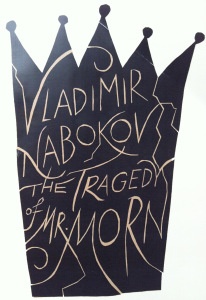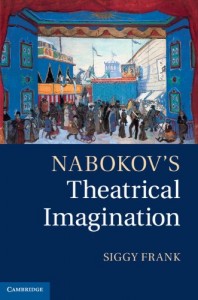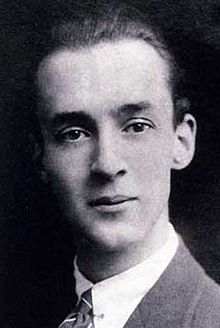Book/Theater Review: Vladimir Nabokov Does That Shakespeherian Rag
Nabokov will become much more seriously playful about extinction and the nature of love in the increasingly complex fables to come. The Tragedy of Mr. Morn is his initial earnest fairy tale.
By Bill Marx
In his ornery public statements, Vladimir Nabokov was no fan of the stage, which he characterized memorably at one point as “a group activity, that communal bath where the hairy and the slippery mix in a multiplication of mediocrity.” Still, he wrote a number of plays (to my knowledge, none have been produced in New England), and his fiction proffers plenty of theatricality, most notably the Pirandellian end of Invitation to a Beheading, where the machinery of execution turns out to be nothing but a paper-mache theater set that collapses at the feet of the condemned protagonist, who walks out of the novel free. Nabokov boasted that his fictional characters were little more than his “galley slaves,” but theater presented him with the alluring idea of duality, of a world elsewhere, a life to be found somewhere beyond the ornately jerry-rigged scaffolding of consciousness. Readers and theater lovers interested in exploring Nabokov’s manipulation of the metaphor of the stage should turn to Siggy Frank’s excellent volume Nabokov’s Theatrical Imagination (Cambridge University Press, 2012).
Nabokov’s first full-length play, written at the age of 24 and never performed or published in his lifetime, has recently been translated into English by scholar Thomas Karshan (whose Vladimir Nabokov and the Art of Play is a fine if exhaustive critical study) and Anastasia Tolstoy, the great-great-great-granddaughter of Leo Tolstoy. The Tragedy of Mr. Morn (FSG, 147 pages, $26) is a fascinating work, shedding considerable light on Nabokov’s later fiction. Yet it is understandable why the imperious perfectionist didn’t translate the script into English, as he did his early Russian novels—the play is written in blank verse and whips Shakespearean airs through the story of a double-dealing king who, forced to acknowledge his humanity, turns to suicide. The melodramatic-cum-surrealistic plot is filled with poetic, Bard-influenced meditations on kingship, death, revolutions, counterrevolutions, and illicit passion, though these themes are filtered through the aftermath of the Russian Revolution and the despair of the exiled community Nabokov was part of.
The play is set in a dreamy, imaginary kingdom, a beautiful, harmonious, and prosperous place that was rescued from revolutionary anarchy by its ruler, who exercises his power from behind a mask. Morn is the monarch, and when he removes his disguise, he is free to move about the kingdom, to bask (incognito) in his people’s love, and to have an affair with the wife of one of the defeated rebels, Ganus. The latter returns from a labor camp and discovers (disguised as Othello at a masquerade party) that Morn is romancing his wife, Midia. The resulting duel takes the form of an agreement: the man who draws the low card must kill himself. Morn is the loser, but he decides to flee with his mistress (and his loyal advisor Edmin, who is in love with Midia), which tosses the land into the arms of nihilistic insurrectionists (“Everything, Ganus, is destruction. And / the faster it is, the sweeter, the sweeter . . .”). Morn’s romance with the flighty Midia soon curdles, and he returns to face his tragic destiny with newfound humility: “I was a bad king:/ unseen, without couriers, I ruled by deception . . . / All my power lay in my mysteriousness . . . / The wisdom of my laws? The creativity/ and joy of power? The love of the people?/ Yes. But empty and deceiving, like the pale jester/ in his moon-like smock, was the soul of the ruler!”
In his introduction, Karshan ticks off the themes in The Tragedy of Mr. Morn that Nabokov will develop over the course of his writing career: “the elusiveness of happiness; the creative and destructive playfulness of the imagination; courage, cowardice, and loyalty; the truth of masks; the struggle of freedom and order for possession of the soul; the sovereignty of desire and illicit passion; and what one character calls “that likeness which exists/ between truth and high fantasy. . .” He is not as forthcoming regarding the work’s weaknesses, particularly its sentimentality.
Frank argues that irony, a vital element of Nabokov’s mature artistic arsenal, is missing from the list. He grounds the play in its artistic and historical context, viewing it as an exercise in regret: “Morn’s dilemma mirrors the predicament of the White emigration. The relief at having survived was soon overshadowed by a feeling of guilt at having abandoned their native country instead of giving their lives to the ‘honorable’ cause of saving Russia from the Bolsheviks.” The unforgivable sin was to refuse to fight the forces of destruction, characterized in the play as the aesthetic worship of social breakdown. Tremens, the play’s rebel leader, celebrates deconstruction: “Do you see,/ one windy night, by moonlight, the shadows/ of ruins? That is the ultimate beauty —/ and towards it I lead the world.”
Karshan doesn’t specifically mention Shakespeare’s Richard II as a model for Nabokov’s tragedy, but that history play seems to me to be a major inspiration—like Morn, the arrogant monarch doesn’t assume tragic grandeur status until he has been removed from office and faces his failure. Yet Richard is transformed into a figure of pathos because of how majestically he articulates a newfound consciousness of his “fallen” state. Nabokov’s manichean set-up pushes a passive Morn into martyrdom because the world around him—his bewitching mask—is dissolved by the entropic strength of the revolutionaries, the decay of love, the weakness of the imagination, etc. Morn accepts his fate outside of the drama—pages of text are (apparently) missing between Act 4 and 5, the former ending with a weird cliffhanger of an scene in which Ganus, who has tracked Morn down, has his prey at gun point and is about to pull the trigger. In the final act, Morn has somehow miraculously escaped and, once back in his kingdom, decides to end it all, converting sin into an honorable act, even though it dooms his people to chaos.
The translation sometimes comes off as half-baked Shakespearean pastiche, particularly some of the strained lyrical effusions of Morn (“May I kiss the rays of your collarbone?”). Yet there is eloquent and buoyant language here, from the anarchistic rantings of Tremens, the skeptical questions posed by the Foreigner who has “come from the Twentieth Century,” and the detached philosophizing of the aged councilor Dandilio, whose embracing admiration for existence trumps all, even death: “I love all this: shadows,/ light, the specks of dust in a ray of sunshine; / these pools of light on the floor; and large books/ that smell of time. Death is curious, I don’t/ dispute . . .” Nabokov will become much more seriously playful about extinction and the nature of love in the increasingly complex fables to come. The Tragedy of Mr. Morn is his initial earnest fairy tale.
Bill Marx is the editor-in-chief of The Arts Fuse. For over three decades, he has written about arts and culture for print, broadcast, and online. He has regularly reviewed theater for National Public Radio Station WBUR and The Boston Globe. He created and edited WBUR Online Arts, a cultural webzine that in 2004 won an Online Journalism Award for Specialty Journalism. In 2007 he created The Arts Fuse, an online magazine dedicated to covering arts and culture in Boston and throughout New England.
Tagged: Russian, The Tragedy of Mr.Morn, translation




Fascinating stuff. Glad you reviewed it and doubt it will get much attention elsewhere!